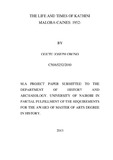| dc.description.abstract | This project paper is an in-depth and intimate look at Kathini Maloba-Caines
personal and public life. It traces her growth from the young and brave child to a
dedicated trade unionist and political activist. It critically examines her struggles for
workers' rights. The objectives of this study were to examine Kathini Maloba-Caines
early life and educational experiences, how she organised workers and her
participation in Kenyan politics. Effective Leadership Theory and the Path-goal
Leadership Theory guided this study. These theories were instrumental in assessing
the extent to which Kathini's leadership strategies and activities in the trade union
movement improved the terms of service of the workers she organized. This study
was conducted using secondary and primary sources.
Kathini Maloba-Caines was born on 13th October 1952 in Kalawa Village,
Changwi Location of Kitui District. She adopted the fighting spirit against injustices
from her mother and from a tender age, learnt to fight for her own rights. This would
later see her fight for workers' rights. Kathini joined Kalawa Primary School in
January 1961 and studied without interruption until 1967. She was admitted at
Mulango Girls' High School in January of 1968 and later joined Machakos Medical
Training College and graduated in June 1972. From Machakos Medical Training
College, she was first posted at Wajir District Hospital in September 1972. After
serving for only three months, Kathini was appointed to head the hospital due to her
exemplary performance. In January 1974, she was transferred to Eldoret District
Hospital where she served until December 1975 when she went for a vacation. During
the vacation, she luckily got a job at Wananchi Medical Clinic in Nairobi where she
worked until April 1976. She later served at the M.P. Shah hospital for one and half
years and that marked the end of her nursing career.
Kathini pursued accounting courses while serving as a nurse. Thus in August
1978, Kathini became an accounts clerk at Kenya Tea Development Authority
(KTDA) and she was gradually promoted to the position of assistant accounting
officer. At KTDA, Kathini did not miss to notice injustices and this prompted her to
organize her colleagues to join Kenya Plantation Agriculture Workers Union
(KPAWU). Due to her zeal to fight for workers' rights, Kathini resigned from KTDA
in August 1985 and joined International Federation of Plantation, Agriculture and
v
Allied Workers (IFPAA W) as the country director in Kenya. Besides, she did a lot of
consultancy work with International Labour Organization (lLO) in the early 1990s. In
December 1995, Kathini was elected the first Secretary General of lnternational
Union of Food, Agricultural, Hotel, Restaurant and Catering, Tobacco, and Allied
Workers' Associations (IUF) in Africa - a position she held until October 1998 when
her first term expired. During the second election, Kathini was re-elected in a hotly
contested race. She served until the year 2000, when she resigned to pursue her
personal interests.
In early 1990s, Kathini and other women trade unionists formed Kenya
Women Workers Organization (KEWWO) in response to the failure by COTU to
form a women's wing. KEWWO's primary activities and programs aimed at
ameliorating the working conditions of women workers by attempting to organize the
unorganised ones, so that their work related challenges could be dealt with promptly.
Through KEWWO, Kathini has advocated for better terms of service for women
employees such as maternity leave, commensurate wages among others. Besides
fighting for workers' rights, KEWWO trained women unionists to enable them fight
for their rights within the workplace. Organising workers outside the trade union
movement structure in Kenya was not very easy for KEWWO due to external
inference. Hence, KEWWO was closed down in October 2010. Nonetheless, Kathini
is still determined to revive the organisation.
Aside from fighting ceaselessly for workers' rights, Kathini has not been left
out in the democratization agenda in Kenya. She first entered politics in 1975 and
embraced socialist political ideologies. During the 1980s when Kenya faced political
repression, Kathini fought for the restoration of democracy in Kenya through
underground political activities. She thus recognizes the role of the academia, women
and the civil society in the fight for the second liberation in Kenya. In 1991, Kathini
and other pro democracy leaders formed the Kenya Social Congress (KSC) party after
the repeal of the infamous section 2 A of the old constitution. In 2007, Kathini
contested the parliamentary seat of Kitui Central Constituency, but lost to Charity
Ngilu since the polling exercise was marred with irregularities. Since the 2007 general
election, Kathini has taken a break from mainstream politics, but she is still fighting
for democracy and workers rights in Kenya. | en_US |

